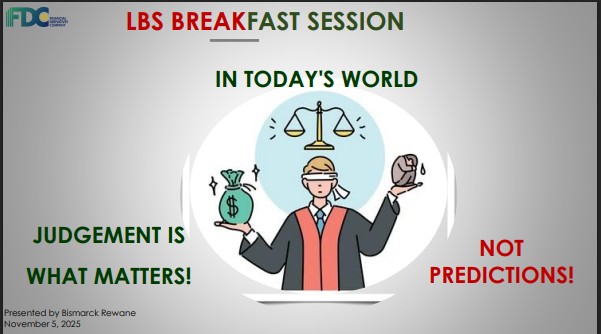Copyright bizwatchnigeria

If you’ve ever followed Nigeria’s economic cycles closely, you’ll know one thing: forecasts often make great headlines but rarely match reality. And that’s precisely what Bismarck Rewane hammered home in the LBS November 2025 Report — judgment, not prediction, is what truly matters. The report, presented at the Lagos Business School Breakfast Session, pulls no punches. It starts with a provocative assertion: “When the unknown unknowns are more than the known unknowns, investor paralysis prevails.” In other words, forecasting in today’s Nigeria is a high-stakes guessing game. But beyond the witty quotes and cautionary tone, the LBS November 2025 Report paints a picture of cautious optimism — one rooted in data, tempered by experience, and sprinkled with humor that only Rewane can deliver. A Year That Proved Economists Wrong Remember when analysts swore that the naira would hit ₦3,000 per dollar? Or that the Dangote Refinery wouldn’t operate until 2031? None of that happened. According to the LBS November 2025 Report, those major forecasts “never materialized.” The naira, in fact, stabilized around ₦1,460–₦1,500 in Q4 2025, a surprising turn that even seasoned forecasters didn’t see coming. And that’s the essence of this year’s economic narrative — unpredictability. Global events like the Trump administration’s tariffs and the CPC designation rattled markets, yet Nigeria’s economy held its ground. Inflation, which once seemed unstoppable, moderated to 17.5% in October and is projected to settle around 16.9% by December 2025, as detailed in the LBS report. The takeaway? Predictions are fragile. Judgment — especially sound economic judgment — is priceless. Why Judgment Matters More Than Models Forecasts depend on data; judgment depends on interpretation. The LBS November 2025 Report makes a sharp distinction between analysts and soothsayers. Analysts rely on models, evidence, and probabilities. Soothsayers? They rely on vibes. Rewane’s point is clear: no amount of economic modeling can account for the imponderables — those “unknown unknowns” — that shape outcomes. COVID-19, the oil price crash, and even global wars remind us that economies are cyclical and shocks are inevitable. So, what’s the way forward? As the report notes, we must “assign probabilities and appropriate weights” to forecasts, then layer them with judgment. In practical terms, that means making decisions with both the data and a healthy dose of skepticism. It’s not just a lesson for policymakers — investors and executives, too, must learn to think probabilistically. Should you invest when inflation’s falling but rates remain high? Should you hold naira assets when the exchange rate seems steady but oil prices are shaky? These are judgment calls — not predictions. Nigeria’s Scorecard: Not Perfect, But Promising Numbers don’t lie, but they do tell complicated stories. The LBS November 2025 Report offers a comprehensive macroeconomic scorecard showing both missed targets and bright spots. Take GDP growth: the report places Q4 2025 growth at 4.06%, slightly below target but still impressive considering the volatility of oil markets and global inflation pressures. Inflation, though high, is easing. External reserves climbed above $44 billion, signaling improved forex stability. And perhaps most reassuring for the markets — the stock market remains bullish. By October 2025, the NGX All-Share Index rose over 35% year-to-date, driven by strong corporate earnings and renewed investor confidence. The LBS report projects an additional 8% uptick by year-end, suggesting momentum will spill into 2026. Yes, challenges persist — sluggish oil output, rigid monetary policy, and fiscal strain. But the tone of the LBS presentation is unmistakable: this isn’t a crisis; it’s a recalibration. Inflation, Rates, and the Judgment Call Here’s where it gets interesting. The LBS November 2025 Report warns that while inflation is easing, the Monetary Policy Rate (MPR) — stuck at 26.75% — may not be cut soon. The Central Bank of Nigeria (CBN) seems cautious, balancing between fighting inflation and supporting growth. Now, here’s the judgment angle again. A textbook economist might say: “Cut rates to stimulate the economy.” But judgment says otherwise. With the U.S. Federal Reserve likely holding rates steady, an aggressive Nigerian rate cut could trigger capital flight and weaken the naira. Rewane’s team estimates only a 15% chance of an MPR cut in November, noting that the smarter play may be patience — wait for disinflation to hold before easing policy. That’s not forecasting; that’s discernment. The Market’s Mood — Still Hopeful Markets are emotional creatures. The LBS November 2025 Report captures this perfectly: while volatility will “come back, but not much,” Nigeria’s fundamentals look better than the headlines suggest. Oil prices, though softer, remain above $60 per barrel. Investor sentiment is improving, and non-oil sectors like entertainment, tech, and manufacturing are gaining steam. One of the most striking parts of the report is its note on Nigeria’s entertainment and media sector — projected to grow 7.2% CAGR through 2029, outpacing Kenya and South Africa. It’s a reminder that while we obsess over exchange rates, the creative economy quietly thrives. Even “Dirty December,” as the report humorously calls it, is now a legitimate GDP driver, with Lagos alone expected to generate over $70 million in tourism-related spending this year. Who would’ve predicted that? Beyond Predictions: The Real Lesson The LBS November 2025 Report isn’t just a collection of charts and forecasts. It’s a wake-up call. It tells us that while models can guide us, judgment must lead us. The final words of the presentation sum it up beautifully: “Macroeconomics is about judgment, not prediction.” In a world full of noise, that’s wisdom worth holding onto. For Nigeria’s policymakers, entrepreneurs, and investors heading into 2026, this means one thing — think beyond the data. Question assumptions. Adjust to surprises. And when forecasts fail, let experience, context, and good judgment steer the course. You can read the full analysis and data breakdown in the LBS November 2025 Report here — a document every serious investor should have bookmarked this season.



